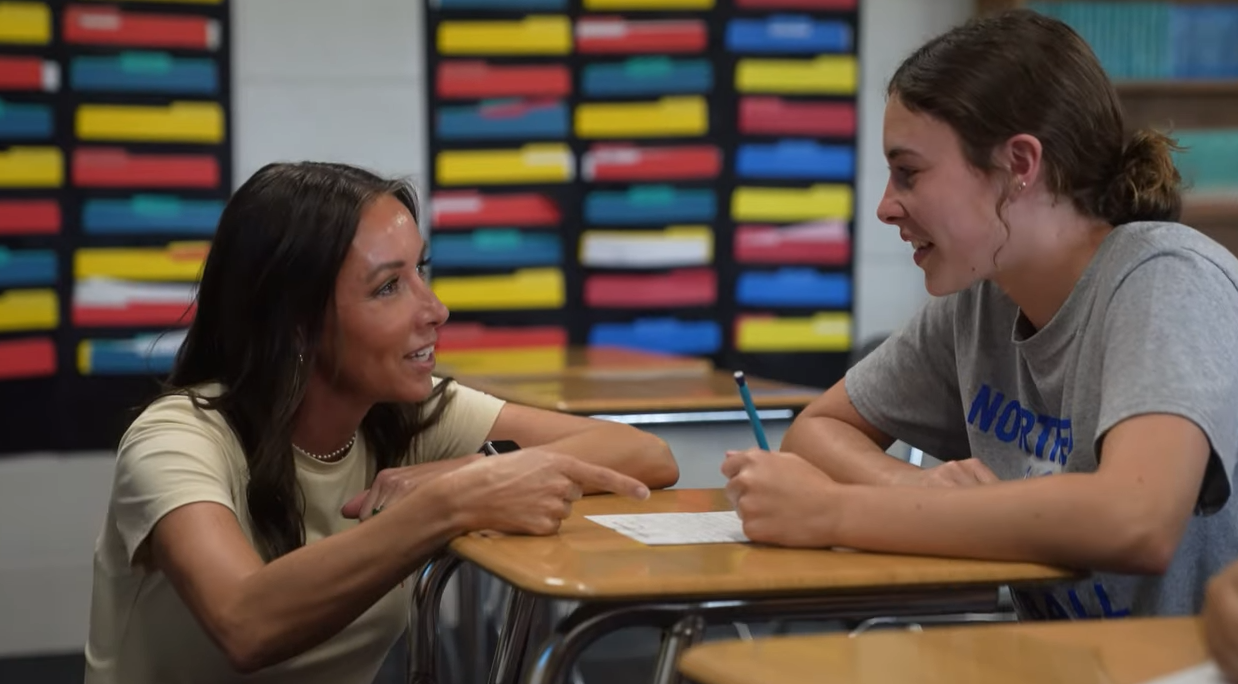-
-
- Financial Aid
- Financial Aid
- Scholarships
- Loans
- Grants
- Federal Work Study
- Additional Resources
-
You want to be a teacher, but you didn’t major in education. That’s okay! We’ll guide you through the process of transitioning to teaching.
Transition to Teaching is a graduate-level program designed for people like you who have a bachelor’s degree and want to become a teacher. When you join Taylor’s Transition to Teaching program, you'll take a series of online classes with local school experiences, leading to eligibility for Indiana state licensure. You can earn your Indiana teaching license in as little as 18 months!
Non-Indiana residents: Anyone can do this program, even international students. For non-Indiana residents, we encourage you to reach out to your state’s education department first to ensure our program meets the credentials of your state. Once you complete the program, our team can help you transfer your Indiana license to another state. Indiana has reciprocal agreements with most U.S. states, although some states may have a few additional requirements such as passing their state’s licensure exams. If you live or teach outside of Indiana, search for your state’s reciprocity. We’ll be there to guide and support you through the process.

Kat Haupert is a 2025 Transition to Teaching completer who teaches seventh grade and sophomore language arts in Indiana. Learn how TTT was beneficial to her while teaching.

Want to start teaching now? If you are accepted into our program, enrolled in a course, and employed in an Indiana school, you may be eligible for a 3-year Transition to Teaching permit.
Request InformationYou will be prepared to teach in one of these areas:
You will take 9 classes to become an elementary teacher in Indiana.
You’ll take 7 classes to become a middle or high school teacher in Indiana:
You can earn a secondary license through Taylor for these content areas:
You’ll take 10 classes to become licensed as an all-grade teacher within a specialized content area in Indiana.
You can earn an all-grade license through Taylor for these content areas:
You’ll take 8 classes to become licensed for mild intervention in Indiana.
You’ll take these 8 classes to be licensed to teach English-language learners in Indiana:
The process is simple.
Applications are accepted year-round. Upon acceptance into the Transition to Teaching program, you can begin classes any day of the year. In just 12 to 24 months, you could have your own classroom—so, get started!
*Email transcripts to [email protected] or mail to:
Taylor University, Education Department
ATTN: Director, Transition to Teaching/Online Licensure Programs
1846 Main Street
Upland, IN 46989
Classes have flexible start times when you pay tuition as you proceed through the program. You can select your course start date. So you don't have to wait for a semester or scheduled date to get started.
Those using financial aid will work through our program in traditional semester terms. Those who are not using financial aid can select their course start date and will have four months to complete the course.
Taylor offers the lowest tuition in Indiana for an online, faith-based program. We don't want cost to stop you from fulfilling your calling to teach!
There are two potential sources of financial aid. Both are student loans—Federal Direct Student Loan and Alternative Student Loan Program.
Federal Direct Loan requirements:
Features:
*Note: Courses outside the specific state requirements, even if recommended by Taylor (i.e. undergraduate prerequisite courses), cannot be considered when calculating the student’s Federal Direct Loan eligibility nor can they count toward the student’s half-time enrollment status.
Alternative Student Loan requirements:
Features:
You can choose your own start date if you pay out of pocket. You have 4 months to finish each class.
Classes are offered in the fall, spring, and summer for students using financial aid. Terms are 15 weeks long.
The process is simple.
Applications are accepted year-round. Upon acceptance into the Transition to Teaching program, you can begin classes any day of the year. In just 12 to 24 months, you could have your own classroom—so, get started!
*Email transcripts to [email protected] or mail to:
Taylor University, Education Department
ATTN: Director, Transition to Teaching/Online Licensure Programs
1846 Main Street
Upland, IN 46989
Classes have flexible start times when you pay tuition as you proceed through the program. You can select your course start date. So you don't have to wait for a semester or scheduled date to get started.
Those using financial aid will work through our program in traditional semester terms. Those who are not using financial aid can select their course start date and will have four months to complete the course.
Taylor offers the lowest tuition in Indiana for an online, faith-based program. We don't want cost to stop you from fulfilling your calling to teach!
There are two potential sources of financial aid. Both are student loans—Federal Direct Student Loan and Alternative Student Loan Program.
Federal Direct Loan requirements:
Features:
*Note: Courses outside the specific state requirements, even if recommended by Taylor (i.e. undergraduate prerequisite courses), cannot be considered when calculating the student’s Federal Direct Loan eligibility nor can they count toward the student’s half-time enrollment status.
Alternative Student Loan requirements:
Features:
You can choose your own start date if you pay out of pocket. You have 4 months to finish each class.
Classes are offered in the fall, spring, and summer for students using financial aid. Terms are 15 weeks long.
Learn to teach from one of Indiana’s top education programs.
Contact
Lyn Kline
Graduate Enrollment Counselor
765-998-4878
email